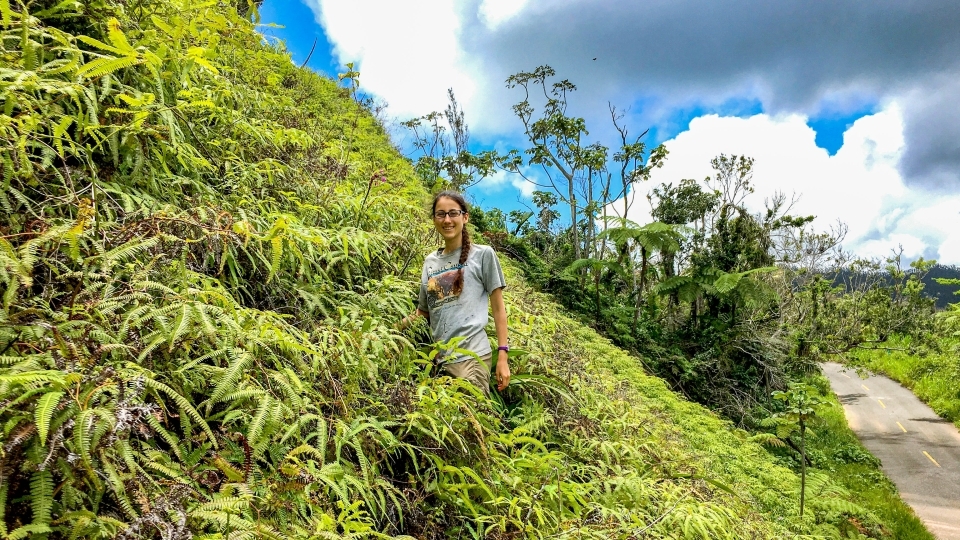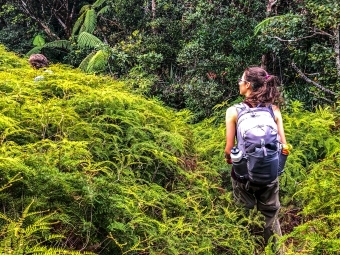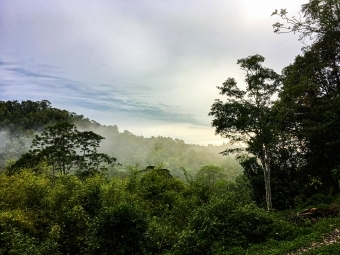Chasing Orchids: Lydia Soifer ’20 Earns Smith Scholarship
May 13, 2020
- Author
- Mary Elizabeth DeAngelis

From rain forests to cloud forests, Soifer has traveled the world to learn about the many and varied species of orchids.
Lydia Soifer’s favorite moments usually involve a forest.
From waking up to the cries of howler monkeys in the Amazon Rainforest, to hiking to the top of a mountain to get to a cloud forest in Australia, she feels joy in the midst of trees.
Take the cloud forest, which some call “elfin forests.”
“A group of us were hiking up a mountain, and going through different forests along the way,” she said. “When we got to the top, it was misty and dewy with lots of orchids and plants–like a miniature rainforest.
“It was beautiful, and so peaceful—it was kind of magical.”
St. Louis native Soifer ’20 developed a wonder for nature as a young kid who’d rather explore in the woods than watch TV. She collected treasures like cicada shells to keep in her bedroom. She also loved books, and found that a sturdy tree branch offered an excellent reading spot.
At Davidson College she began studying orchids and produced independent research that professors say reads more like the work of a doctoral candidate than an undergraduate.
That research will continue: Soifer has received the college’s prestigious W. Thomas Smith Scholarship.
Modeled after scholarships like the Rhodes and Fulbright, the Smith award honors outstanding academic achievement, leadership and community service. The scholarship pays for a student to pursue a master’s degree at a university abroad.
Soifer plans to head to the University of Cambridge in October to work with some of the world’s top ecological researchers.
Conservation and Protection
Soifer loves studying orchids because there are so many different types—28,000 species spread across six continents, to be exact.
“There is always something new and surprising to learn about orchids,” she said.
Davidson doesn’t have an orchid expert on its faculty. So, when Soifer became passionate about the topic, she developed her own trajectory, professors say.
“Lydia is on the path to becoming a world expert in orchid biology and conservation,” Associate Biology Professor Kevin Smith wrote in his recommendation. “Lydia is courageous in exploring opportunities and has always impressed me with her willingness to do difficult things on her own.”

The summer after her first year at Davidson she went to the Amazon Rainforest in Peru as a volunteer for Operation Wallacea, a conservation research organization. She measured trees, counted birds and collected data.
“I’ve never been in a more remote area, we were a day and a half from the nearest town,” she said. “We’d wake up to howler monkeys and you’d think from the sound that they were these big beasts, but they were little.”
One day she heard leaves rustling and looked down and saw a venomous snake a few feet ahead. She stopped in her tracks to let the snake slither away.
“That’s why the field team brings medical supplies,” she said, adding that wearing rain boots is another precaution against snakes. “I love being out there so much it’s worth it.”
She came back to Davidson that fall thinking she’d study birds, but after talking to her research advisor, the late Biology Professor Pat Peroni, decided to focus on pink lady’s slipper orchids.
“We want to conserve them and protect them,” Soifer said. “Dr. Peroni gave me the freedom to explore the topic and we designed a research project based on my interests.”
Soifer spent the summer after her second year at the University of Puerto Rico on a National Science Foundation Research Experience for Undergraduates grant. She modeled the distribution of an invasive orchid that threatens native orchids.
“We drove around Puerto Rico looking for orchids,” she said. “It was a lot of fun.”
Soifer published her research from that summer in the Biological Invasions journal.
She spent the next semester abroad in Australia and hiked and researched in the forests there.
In 2019, she presented a research poster at the International Orchid Conservation Congress’s conference in London. She talked to scientists there about her Davidson research and they invited her to the International Orchid Conference and Workshop for Young Scientists in Poland. She received the award for best oral presentation.
“I got to meet orchid researchers from all over the world,” she said. “It was really cool meeting people whose writing I’d been reading for my pink lady’s slipper honors thesis.”
Chris Thawley, a visiting assistant professor of biology at Davidson, says Soifer’s research has made him learn new and complicated methods.
He’d never worked with plants before but advised Soifer on computational and statistical aspects of her research.
“It was a really nice match,” Thawley said. “She’d do her research and if she ran into a problem would come back to me. She was doing very advanced statistical analyses. I joke with her that she made me learn all these models that I had been putting off.”
Quiet Leader, Great Mentors
Soifer started taking modern and ballet dance lessons when she was four. She belonged to the college’s Gamut Dance Company, a student run organization for trained dancers.
She has been a team and trip leader for Davidson Outdoors. She’s also served as a biostatistics assistant teacher and tutors other students.
Her professors describe her as a quiet leader always willing to learn, and help others learn.
“She is not the first voice or the loudest voice to speak in a group,” Smith wrote. “Despite her academic achievements and impressive knowledge, she is strikingly aware of what she doesn’t know and is therefore always able to learn more and to be an expert without intimidating others.”
Early on at Davidson, Peroni advised her to pursue spatial ecology research with the pink lady’s slipper orchids, even though spatial ecology didn’t fall into Peroni’s area of expertise.
“Rather than guide me into a project closer to her field of study, Dr. Peroni encouraged me to do what I was interested in,” Soifer said. “She put me in contact with people who could help me with the aspects of my project that she was not familiar with.”
Peroni also encouraged her to apply for a Dean Rusk grant to work with orchid researchers abroad.

Photo by Lydia Soifer
“I was a bit nervous to email professors in another country that I had never met and ask them if I could help with their research,” Soifer said. “It turned out to be an amazing experience. I ended up shadowing researchers in Italy, London and Estonia and learned about orchid propagation, genetics and population ecology.”
When Peroni was diagnosed with cancer last year and stopped teaching, she arranged for others, including Thawley, to assist and advise Soifer. Peroni remained in touch, and came to Soifer’s preview thesis presentation in October.
“When I heard about her death in December, I was devastated that I wouldn’t get to share my thesis research with her,” Soifer said. “It never would have happened without her constant support and encouragement.”
With her time at Davidson ending, Soifer says she’s going to especially miss her professors. Back in high school, as she weighed her college choices, she emailed five Davidson professors that specialize in organismal and ecological biology. She thought she’d wouldn’t hear back from any of them.
Every single one responded, offering to meet, talk on the phone or invite her to tag along on a research project with students, she said.
“They’ve been so supportive—even professors I didn’t have in class were always willing to talk something through,” Soifer said. “I’ve had such great mentors here.”



